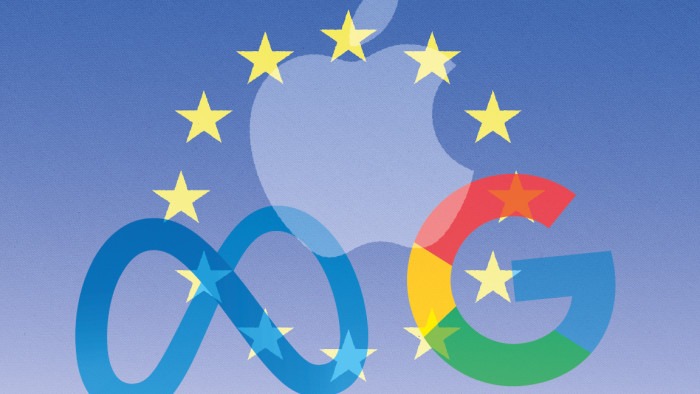
Last updated on April 8th, 2024 at 10:17 am
Tech companies could face significant fines if found to be in violation of the Digital Markets Act
The EU is investigating Apple, Google’s parent company, and Meta for potential violations of the bloc’s new laws aimed at regulating anti-competitive behavior by major technology firms.
If found guilty of breaching the Digital Markets Act (DMA), the companies could face substantial fines. The DMA, which came into effect on March 7, is intended to increase choice for online consumers.
The European Commission, the EU’s executive arm, is examining potential violations related to several issues:
- Apple and Google’s practices allowing app developers to direct users to offers outside their app stores.
- Whether Alphabet, Google’s parent company, gives preference to its own services, such as Google Shopping, in search results on its search engine.
- Meta’s decision to charge users for an ad-free experience on Facebook and Instagram, and whether it complies with DMA provisions on users’ personal data.
- Whether Apple facilitates easy selection of alternative browsers on their phones.
“The commission suspects that the measures implemented by these gatekeepers do not fully comply with their obligations under the DMA,” stated the commission.
The law mandates that the six tech “gatekeepers” – Alphabet, Amazon, Apple, Meta, Microsoft, and ByteDance (owner of TikTok), which provide services like search engines, social networks, and chat apps used by other businesses – adhere to guidelines to ensure fair competition for their competitors and offer users more choices.
Thierry Breton, the commissioner for the internal market, warned that the companies faced the risk of “substantial fines” if they were found to have violated the act.
“The Digital Markets Act became effective on 7 March,” he noted. “We have been engaged in dialogues with gatekeepers for months to assist them in adjusting, and we are already witnessing changes in the market. However, we are not convinced that the approaches taken by Alphabet, Apple, and Meta fulfill their obligations to create a fairer and more open digital environment for European citizens and businesses.”
Competition Commissioner Margrethe Vestager stated that the companies had ample time to adhere to the act, noting that the commission had collaborated with them to ensure compliance.
“I certainly do not believe this is rushed,” Vestager informed reporters. She emphasized that the purpose of the new laws was “not to pursue cases,” but rather to provide consumers with the choices they are entitled to under competition laws.
“The sooner we see changes, the sooner consumers can benefit from the DMA,” she remarked. The EU has implemented “strong deterrents” to encourage tech companies to fulfill their obligations seriously, including substantial fines for those that do not meet the required standards.
Failure to comply with the DMA can lead to fines of up to 10% of turnover, increasing to 20% for repeated violations. Apple’s annual revenue last year was $383 billion, while Alphabet’s was $307 billion, and Meta’s was $134 billion.
The commission is also investigating Apple’s new fee structure for alternative app stores and Amazon’s ranking practices on its marketplace. The EU executive intends to complete these investigations within a year, in line with the timeframe outlined in the DMA.
Anne Witt, an antitrust law professor at the EDHEC Business School in France, noted that the commission had acted swiftly in implementing the act. “The commission has definitely not hesitated in initiating these investigations, especially considering that the DMA’s conduct regulations only became applicable to gatekeepers in early March. This is a significant test for the DMA,” she commented.
Max von Thun, the Europe director of the Open Markets Institute, a research organization focusing on the impact of corporate monopolies, suggested that the commission should also be prepared to utilize non-financial penalties permitted under the act, such as mandating the divestiture of business segments.
“The commission should not hesitate to levy substantial fines on the gatekeepers and employ other potent sanctions outlined in the DMA, including structural separation and restrictions on acquisitions, when necessary to compel the gatekeepers to comply,” he stated.
A spokesperson for Meta stated that the company believed its practice of charging for ad-free versions of its platforms was in accordance with the act. “We developed the ‘subscription for no ads’ feature to address several overlapping regulatory obligations, including those under the DMA,” they explained.
Google, which claimed to have made significant changes to its services, stated that it would defend its approach in the coming months. Apple expressed confidence that its strategy complied with the DMA.





